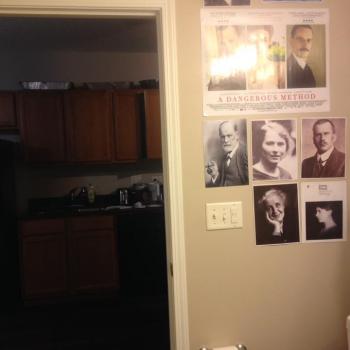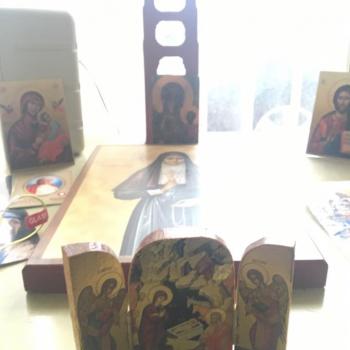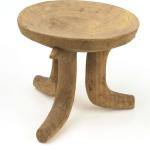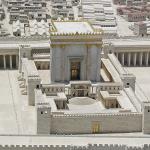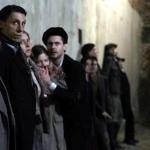![DR. NO - by Johan Oomen, 28 December 2009 (NO-03-R002) (CC BY-SA 2.0 [https://creativecommons.org/licenses/by-sa/2.0/]), via Flickr](https://wp-media.patheos.com/blogs/sites/721/2017/12/4218676097_07e496f547_o.jpg)
As I was planning my honors undergraduate essay in history, I came across a paper in China Quarterly titled ‘Life in the Cities: The Emergence of Hong Kong Man.’ It was written by a sociologist named Hugh Baker, and it had a paragraph that is unforgettable:
“Life in the short term” is not, of course, unique to Hong Kong, but something unique has been emerging from Hong Kong’s cities: it is Hong Kong Man. He is go-getting and highly competitive, tough fro survival, quick-thinking and flexible. He wears western clothes, speaks English or expects his children to do so, drinks western alcohol, has sophisticated tastes in cars and household gadgetry, and expects life to provide a constant stream of excitement and new openings. But he is not British or western (merely westernized). At the same time he is not Chinese in the same way that the citizens of the People’s Republic of China are Chinese. Almost alone in the Chinese world Hong Kong has not adopted Putonghua (Mandarin) as the lingua franca: instead Cantonese holds sway. Admiration for and empathy with his compatriots Hong Kong Man certainly has, but he also now has pride in and love of the society which he has created through his own determination and hard work. He gives little credit to the Union Jack under which his success has been nurtured, and he is not necessarily happy at the prospect of the five-starred red flag presiding over his activities. Hong Kong Man is sui generis and the problems of the territory’s future are more difficult to resolve because of it. (Baker, p. 478-9).
I read this essay because I wanted to write about Chinese Christians. It was what I had intended to do ever since reading James Baldwin in my junior year in high school. I had even written some short stories about two pastors’ kids I called Zach and Beth, loosely based on Zachariah and Elizabeth in Luke’s Gospel, and I published them in the literary magazine I founded with my Holy Cross priest friend. It therefore made sense to understand something about ‘Hong Kong man’ – homo hongkongus or something – whom I have known since childhood is not exactly the paragon of ‘Chinese culture.’When they want to be cool, Hong Kong people, especially the men, think of themselves basically as James Bond in yellowface. It’s as the Cantopop song goes: 你名叫叮噹 個樣似蜜糖 平易近人清新開朗 我名叫KingKong 個款似James Bond最佳拍檔 [Your name is Ding Dong (Doreimon). Your look is like Mut-tong (honey). Your person is so fresh and bubbly. My name is King Kong. My build is James Bond. We’re the best pak dong (buddy-partners).].
Then I moved to Vancouver, and the people in the Chinese churches there weren’t at all like the ‘model minority’ folks in the Bay Area churches. There were a bunch of what we called in popular parlance ‘astronaut families’ that made up the congregations. Astronauts is our way of making fun of people who spend their lives literally in the sky, jet-setting on planes between workplaces in Asian cities like Hong Kong and Shanghai while leaving their wives and kids in North America. The kids have been called parachute kids. Lesser known is what the wives are called. In the United States, they’re termed ‘left-behind beauties,’ because America is the ‘Beautiful Country,’ and they’ve been left there. That moniker doesn’t work in Canada, but because so many of them live in the Vancouver suburb of Richmond and are scared to drive out to the big city of Vancouver, they’re just called ‘Richmond sze lai.’ Sze lai is a vulgar term that literally means ‘master’s breast.’ It’s the wife of a professional, but specifically her boobs. Cantonese is a language that takes no prisoners.
It wasn’t like there weren’t astronauts in the Bay Area, though. When I was in high school, my dad told me there was even a church in San Francisco that had a discussion about whether it was moral or not for Chinese businessmen to have families in every city where they had a base. It was earlier in high school for me, so I thought that this was a strange question. I had no idea how pregnant the inquiry was.
Later on, our church had our own taste of astronaut.
I knew there was trouble brewing in the church because my dad had so many meetings and was losing his temper a lot. I didn’t know how bad it was getting. One day, on our early morning ride to school, he told me the story.
He started talking about the girl who liked me. I didn’t like her back. The way it happened had been a terrible mistake. Back at the old Taiwanese church, this girl had come from Hong Kong. She was in our grade, and I was the only one who had the theological chops and the language skills to translate from English to Cantonese for her. It had never been meant to be anything more than functional. Unfortunately, it happened around the time we were all going through puberty.
Her dad was an astronaut. Her family arrangements were therefore strange. She lived with her mom in the Fremont area. They stayed with my church friends, their relatives, until they got a place of their own. The dad was never seen. We went through the whole process of leaving that Taiwanese church (in part because of the sex scandal) and planting a Cantonese one in Fremont, and still, we had never seen the guy. I wondered if he even existed. Then one day he was in church. He looked like a nice guy.
My dad said that it was a little bit more complicated than that. He had been having meetings at church ever since that guy got back. It turned out that the father of one of my friends was giving my dad trouble. For the last little while, he had been asking during my dad’s home visits about the presence of sin in the church. He’d be one to know; my dad had done an exorcism on his daughter a few years before. This obsession, of course, confused my dad.
Then, one day, he got the story.
The astronaut had called his wife a few weeks before he showed up at church. It was a call from China. This is the last you’ll ever hear from me, he had told her. I love you. Good-bye. Click.
His wife freaked out. The first person she called was the relative. Something was happening to her husband. She didn’t know what it was. He couldn’t help her. She went down the list and called several others. The investment banker couldn’t help either. Neither could the forty-year-old first-year law student married to a woman twenty years younger than him, though he was intrigued. Finally, she called a big-time computer CEO with some connections in China. Using them, he found out what happened. It was bad.
It turns out that the astronaut had worked in a bank in China. There, he had embezzled one million U.S. dollars.
Do you know what embezzlement is? Dad said to me as he was driving.
Yes, I replied. Remember I typed most of your dissertation on pastoral sexual misconduct in Chinese churches.
Oh right, he said.
What was going to happen to the astronaut, who had pissed off the Chinese government because banks there are apparently part of the centralized market socialist economy, is that he was due to be shot by a firing squad. But then, the CEO took one million U.S. dollars in a briefcase and flew over to China. Using his connections, he somehow got to the astronaut before he was fired (upon). He bailed him out. That’s why he was in church the next week.
Now, pastor, my friend’s dad had challenged my dad, can you let this kind of unconfessed sin go unmentioned in your church when this guy applies to become a member? That’s why Dad was so stressed: the astronaut was applying for membership.
So my dad and the board had a look at the bylaws. It turned out that the membership clause did have something to say about this. To become a member of our non-denominational Bible church, you had to have gone through the ‘repentance of sins’ so that you have a ‘personal relationship with Jesus Christ.’ The question was, the most astute forty-year-old first-year law student (who was on the board) said, and what does ‘repentance’ mean? That’s the real reason I never became a lawyer. The question what the word is is is annoying.
Our little church plant literally fell apart. My dad was of the position that if the astronaut confessed his sins, everything would be good. But the law student challenged him about what confession meant. In addition, weren’t we saved by grace through faith? If that’s the case, couldn’t the astronaut just confess his sins directly to God? Who are we to judge his intentions? This line of questioning made sense to a bunch of Brethren folks from Hong Kong who had joined our church. The point of Brethren polity is that ordination is illegitimate, so they didn’t like how my dad was wielding his pastoral power. In addition to lacking grace, he was also seen as power-hungry. They hosted milk tea parties at their house to tell the rest of the folks at church not to trust my dad. I went to one of these parties once. It was awkward. My dad got out by moving to Vancouver. That guy relapsed and went to prison. It turned out he had a gambling problem, so he needed to embezzle, and he did it again.
I’ve told this story in one way or another in public gatherings and have maybe mentioned it in some writing, so again, I’m not afraid for it to go public. In fact, I’ve worked through it, and I’ve become Eastern Catholic. We are pretty clear about what confession, repentance, and ordination mean. Maybe that’s why I can write about it now, finally.
However, my point is not that you should feel sorry for me and my adolescent church trauma. Instead, I am simply saying that oh yes we knew what an astronaut was by the time we got to Vancouver. And the churches in Vancouver were loaded with them.
Whenever my dad has church trauma, he writes a dissertation. This is how he has two doctorates. His first doozy was with that pastor guy who ran off with my friend’s mom, so his Doctor of Ministry dissertation was on pastoral sexual misconduct in Chinese churches. This astronaut thing, combined with his experience working with astronaut men who come to church in Vancouver with all of their sexual dysfunction and other baggage, was his second trauma. Therefore, his second doctorate in Education from Argosy University focused on the sex lives of astronauts. I also got to type most of this thesis.
What you have to do if you’re going to write about astronauts in this intimate way is that you have to understand their fantasy lives. That’s where ‘Hong Kong man’ comes in. You can’t just understand them as Chinese. That’s not what turns them on. They want to be James Bond. James Bond is like a cartoon character, my parents say. He can never die.
James Bond is a character from my parents’ generation. My parents remember seeing For Your Eyes Only in theaters. The CEO with Chinese connections did too. He was the father of one of my best friends in elementary school. Because they were into computers, my buddy always had the latest video games. This is how he had Goldeneye for the Nintendo 64 before everyone else. For me, the James Bond movies are not as important as that game. The multiplayer level Complex consumed all of my time with my friends after church on Sundays. We played with proximity mines.
In this sense, Bond as a character was secondary. One time during a party at my friend’s house, the CEO dad came downstairs with a copy of Tomorrow Never Dies. I think he interrupted my friends and me blowing each other up with proxy mines. It was the latest 007 movie. He said, Oh, James Bond, my favorite, and then put the tape in. The opening sequence of that movie is actually not bad. Bond poses as an arms dealer and blows up a deal, and then escapes in a stolen airplane. But we were bored. James Bond might have been the old man’s favorite, but he was irrelevant to us. If you don’t believe me, you can ask anyone my age who Oddjob is. Chances are we won’t say he’s the Korean dude in the hat from Goldfinger. He’s the short guy you can play in Goldeneye Multiplayer when you want to be cheap and shorter than everyone else so that they can’t shoot you but you can get them easily. He’s to Goldeneye as Kirby is to Smash Bros.
But if you think about the astronaut rescue story that destroyed the church of my adolescence, you could be forgiven for thinking that it’s structured roughly like a Bond film. There’s a scandal of international proportions. A secret agent is sent in to fix it. Using his connections, the 00 solves the problem. Come to think of it, this is also the plot of The Three Musketeers. Rush Hour too.
That’s ‘Hong Kong man,’ and that’s what I expected to find when I looked for literature on this phenomenon. My honors essay supervisor told me that he had actually heard of ‘astronauts.’ That was weird, I thought, as he was a white guy. He was also a top-dog China expert, but astronaut, I thought, was a Cantonese term that we had made up within our community. He told me, though, that he remembered reading about it in a book called Ungrounded Empires. Aihwa Ong, I think the name is, he said.
I found Ungrounded Empires in the reserve section of the university library. I couldn’t make heads or tails of it. It was something about ‘Chinese transnationalism,’ which sounded like astronauts, but Ong and her co-editor Donald Nonini were saying that it was like an ‘alternative modernity’ or something like that, and that made no sense to me because isn’t modernity about Descartes and his intellectual descendants? I found another of Ong’s books next to Ungrounded Empires. This book was titled Flexible Citizenship: The Cultural Logics of Transnationality. It looked like it was about astronauts too, but it made even less sense. There were all these fancy theory words like cultural logics and graduated zones of sovereignty and flexible accumulation, and all I wanted to know was about astronauts, which meant that I wanted to know about their sex lives. The funny thing is that the book is actually about astronauts in the Bay Area. It turns out that the study of astronaut families actually begins with the Bay Area, though there’s a lot on Vancouver now too.
Everybody knows that the whole point of a Bond movie are the girls. That’s why you put up with the stupid plot. The same goes for astronauts. The only reason we church people were fascinated by them was for their sex lives. That’s why that church in San Francisco had that forum about whether it was moral for astronauts to have a family in every town they lived. There were plenty of stories about astronauts doing precisely that, especially with younger women in Asia. There were also tales of astronauts returning to their families in Vancouver, getting bored, and then having sex with half the sze lai population in a given church. Those were called ‘church discipline cases.’ One astronaut who had morals also told us he confronted prominent members of a church over dim sum about their massage parlor tips. You’re going there to eat chickens! he had loudly exclaimed in the restaurant. A chicken in Cantonese is a prostitute.
I soon learned that academic interests in astronauts were very different, even the stuff about astronaut families. To explain the logic of why astronauts would even consider the ‘Pacific shuttle,’ scholars talked a lot about calculation. They might make a cost-benefit analysis: their families could make more money if the breadwinner stayed in Asia. I read some analyses of how Vancouver’s Expo 86 lands were acquired by the richest man in Hong Kong because of this strategy: he had his son make nice with local Vancouver government. The author called this arrangement a guanxi relationship. I thought that was redundant. Guanxi in Chinese means ‘relationship.’
This argument about calculation made some sense, then, but it was more close but no cigar. To be honest, it seemed more like something the first generation required for the second, not something they would do themselves. In my experience, the first generation seemed to run on pure sex drive. They were James Bond and his girls. They then required the second generation to learn from their mistakes and become ruthless, calculating, and austere. A friend of mine sometimes makes fun of me for behaving as an asexual Asian. He doesn’t mean that to demean me; he’s just characterizing my behavior. One of the reasons for that is because I come from a people that might be characterized as oversexual Asians. I feel like that’s the argument that the Asian American historians Henry Yu and Madeline Hsu make in their studies of transnational Chinese Americans from the time. Now I finally understand why they don’t like Aihwa Ong. It’s not about calculation. It’s about desire.
Setting out to understand astronauts in the churches I was in, I sought to analyze ‘Hong Kong man.’ Hugh Baker also has something to say about religion in the same essay:
The major religion of settled China has been ancestor worship, which is associated with continuity of family and land ownership, but the religions of the urban Chinese of Hong Kong are those which stress movement and expediency. There are quite a large number of Christians, whose God can be with them anywhere and under any circumstance, and many people go to temples whose gods have the reputation of bringing fortune or happiness – and when their prayers are not answered they move on to another god or temple. (Baker, ‘Life in the Cities,’ p. 478).
You could call this calculation, but this flitting about religion looks more like unchaste desire to me. But I didn’t know how to pull off such a study. In the end, it was too ambitious for an honors undergraduate essay. I settled on analyzing four Hong Kong comedy movies from the 1970s and what it meant to be a man according to them. They were films by Michael and Sam Hui, the new wave of realistic comedy after the golden age of kung fu in Hong Kong cinema was brought to an end by the death of Bruce Lee. The literature tended to portray these new realist films as emblematic of a ‘Hongkonger’ identity in contrast to Chinese communism. I wanted to go further. I wanted to analyze the James Bond mythology in the film.
I don’t think I quite did that. At one point, I was tripped up by my own misreading of Confucianism in the films, which wasn’t there. I just put it there because I thought that was Chinese culture. I got called out for that at my oral defense.
But I finished the essay. And then, shortly thereafter, I forgot that my work was about fantasy. What happened was I became a social scientist. I’ll write about that next. Eventually, I’ll talk about my own salvation from social science.
I’m proud to say that I was recently interviewed by the South China Morning Post’s Ian Young on astronaut families. My comments for him were much tamer.








